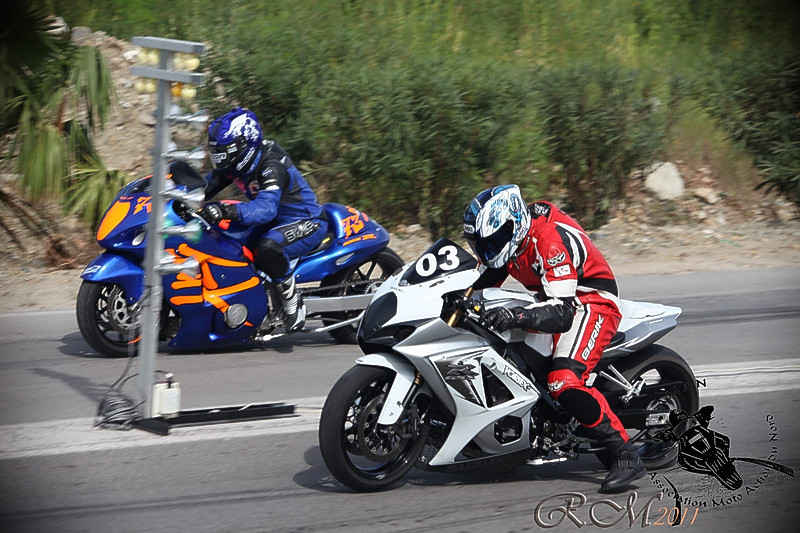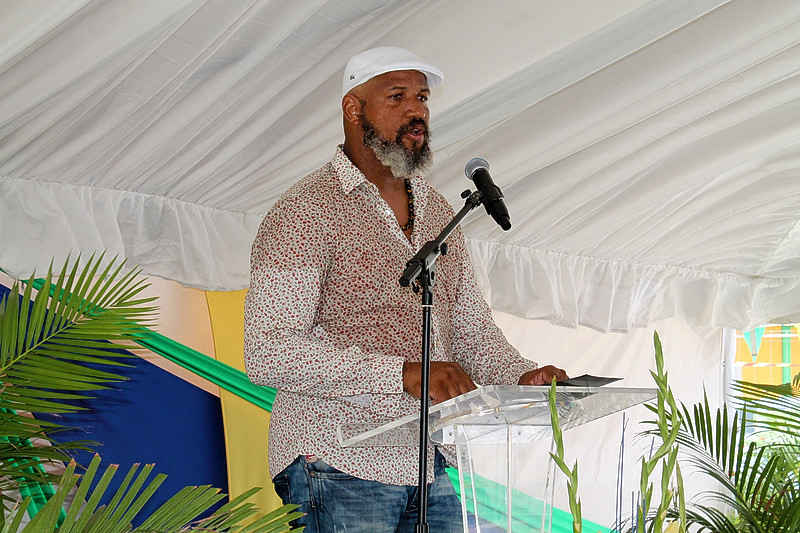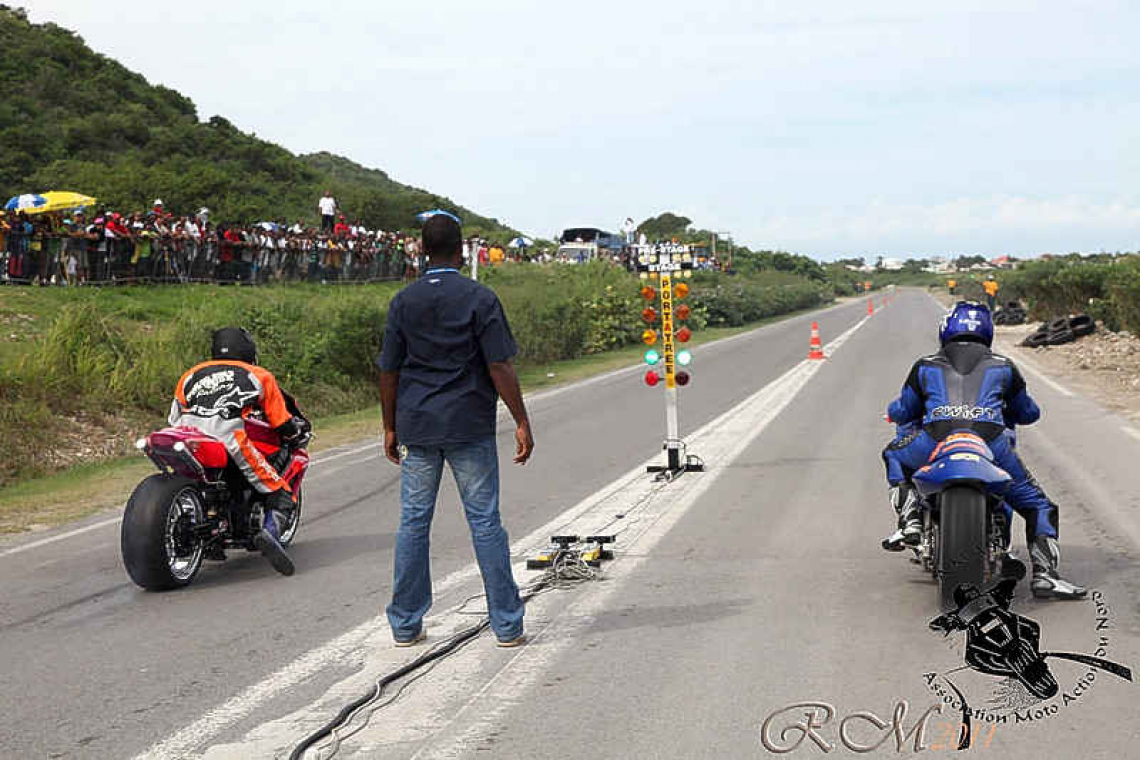Drag racing on the Grand Case by-pass, November 2010. (Ricardy Maricel photo)

Motorbikes accelerate away from the start during a drag race in Grand Case, November 2010. (Ricardy Maricel photo)

Cédrick André: “We need to turn a negative activity into a positive one.” (Robert Luckock photo)
MARIGOT--A collective of young St. Martiners who prefer to remain anonymous has called for authorities and even landowners to provide a dedicated site for motorcycle racing and other activities to be practised safely.
Some suggest that the noticeable increase in joyriding on the main roads, particularly in Sandy Ground every weekend where reckless behaviour on two-wheelers puts other road users at risk, has been caused by frustration felt from unemployment, coronavirus COVID-19 and a lack of activities for youth.
“Faced with the accident that took place in Bellevue, seriously injuring a Gendarme, and taking into account the recurrence of motorbike accidents, we, a collective involving young people, fathers and mothers of families, as well as all those concerned, would like to consult with authorities so that followers of these runs, rodeos and sound cars be granted a site that would allow us to practise our passion without harming the lives of others or our own, while respecting the tranquillity of the neighbourhood and free circulation on our roads,” the collective said in its statement.
It acknowledged fatal accidents occur every year involving two wheelers, and each tragedy affects victims’ families. “Road safety programmes and Gendarmerie controls put in place have unfortunately never succeeded in minimising the damage. Repression does not seem to be the right solution, as we see no improvement,” it insisted. “Unfortunately, no solution has been brought to this problem which often makes headline news. Most of the young people who are victims or are responsible for the problem are branded as delinquents, the role of parents stigmatised, and each drama provokes hateful comments on social networks.”
The collective added that motorbike racing and sound cars are a reality in St. Martin, a reality that no government mandate has really addressed.
“Unfortunately, these young people have no structure to devote themselves to their passion. On an island where youth is often disorientated, where sports activities, facilities and supervision are lacking, it has never been considered to devote an area, even a place common to both sides – French and Dutch – so that the tradition of races and sound cars can take place in a supervised and safe environment as is done in many municipalities. Several requests have been made in this respect, to no avail.”
The collective is calling for authorities to find a quick and efficient solution with consultations involving all those concerned – motorcyclists, motorists, citizens, parents, elected representatives, Police and Gendarmerie – in order to realise a project “that should have seen the light of day a long time ago.”
“We believe in the youth of St. Martin. We are aware of the deep attachment to certain rites and traditions, in which a large number of responsible adults also participate but which must no longer end tragically. Cohabitation, a concept that the island manages perfectly in other areas, must also take place between motorcyclists and road users. This is everyone’s business and must be heard by everyone.”
The first legal drag-racing event held under strict safety conditions took place on the Grand Case by-pass in June 2001, organised by Association Moto Action du Nord (AMAN). The last drag race held was in April 2017, five months before Hurricane Irma struck the island.
Founded in 1999, AMAN is affiliated with racing federations in Guadeloupe and France, with all safety and security aspects for riders and spectators taken into consideration. It was created to stop the illegal practice of “runs” that took place on the RN7. Many will recall the tragic death of Gendarme Raphael Clin, who was struck by a speeding motorbike during a run in Bellevue some 15 years ago.
AMAN President Miguel Mingau said approval had to be sought from the Préfecture to resume racing every two years. Approval was granted based on all necessary safety considerations being in place, good condition of the track, and the presence of Ambulance and first-aid stations, Fire Brigade and extinguishers, etc.
“Since [Hurricane Irma – Ed.] we have been seeking approval again from the Safety Commission at the Préfecture,” said Mingau. “The Gendarmerie had agreed to work with us on the drag racing, and the Collectivité supported the workshops we had planned once a month on safety and wearing helmets – both for drag racing and recreational riding. But the Préfecture still refused to give us approval with no reason given, [despite] the fact that Gendarmes and police would be present.”
COVID-19 has now prevented any large gatherings. At their peak, the drag-racing events attracted thousands of spectators, and have a huge following on other Caribbean islands too.
Mingau said he will be bringing up the subject again with new Préfet Délégué Serge Gouteyron. He agreed that currently young people have nowhere to express themselves.
“Youngsters love this sport, so it does have an important role in our society. But St. Martin is very limited where suitable terrain for it is concerned. Grand Case by-pass was ideal because spectators were protected.”
He said it is important to differentiate between the relatively safe organisation of drag racing in a controlled environment and the random acts of delinquency committed by young people on the public roads, the latter being the responsibility of law enforcement to control in respect to the Highway Code.
“We do not condone reckless or illegal riding. We are not part of that and only promote safe riding and respect for the rules of the road.”
Sandy Ground district representative Cédrick André, who is in tune with the mindset of young people, said performing stunts on the road has always been part of the culture or DNA of St. Martiners since he was a teenager, and is a form of release.
“The difference today, is that the population has multiplied three or four times – there are many more cars and bikes on the road than before,” he said. “There needs to be a structure or an area where young people can express themselves instead of doing it on the main road. They can have fun, train and show off their talent and have competitions.
“We need to turn what is viewed as a negative activity into a positive one. There is a lot of undiscovered talent out there among young people. Shows can be developed and become a tourist attraction. The Collectivité and state should focus on structured activities that create employment and address social cohesion and the economy at the same time. Sports infrastructure is also very important. Sport instils values of respect and discipline.”







